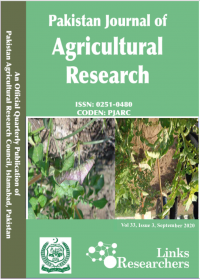Comparing Traditional and Contemporary Approaches to Integrated Pest Management in Major Field Crops
Comparing Traditional and Contemporary Approaches to Integrated Pest Management in Major Field Crops
Muneer Abbas1*, Sohail Abbas2, Imran Faraz3, Niaz Hussain1, Muhammad Aslam1, Muhammad Irshad1, Mudassar Khaliq1, Abdul Ghaffar1, Zubeda Parveen1, Muhammad Nadeem1, Sana Ullah4* and Malik Akhtar Iqbal5
ABSTRACT
Conventional methods of insect control have faced significant challenges, primarily due to the extensive use of pesticides. This overreliance on pesticides has led to issues such as pest resistance and environmental pollution. Some formerly minor pests have transformed into major threats by altering their biology and host preferences. Integrated Pest Management (IPM) offers a promising solution by reducing the reliance on insecticides. Many countries worldwide have successfully adopted IPM techniques to manage crop pests. However, in countries like Pakistan, the adoption of IPM practices remains limited among farmers, resulting in a lack of significant success stories in this regard. In light of the challenges posed by pest adaptation and pesticide resistance in the context of climate change, it becomes imperative to consider IPM as a viable solution. Farmers aiming to implement successful IPM programs should prioritize understanding pests, crops, and the environment. Rather than seeking complete pest eradication, the primary objective should be to manage pest populations at acceptable levels. This review article underscores the significance of (IPM) integrated pest management for farmers as an economically and ecologically sound methodology of pest control. It emphasizes the importance of a comprehensive understanding of pest dynamics, crop behavior, and environmental factors in achieving effective pest management in an evolving climate.
To share on other social networks, click on any share button. What are these?






